Tools Required
J 26900-1 Outside Micrometer
Important:
• Valve clearance measurement should only be done on a cold engine. • To change the valve clearance on a given valve, the lifter must
be replaced by one that is thicker or thinner in size. • Lifters are available in 35 different sizes, in increments of
0.020 mm (0.0008 in). • Lifters range in size from 5.060 mm (0.1992 in)
to 5.740 mm (0.2260 in).
- Disconnect the negative battery cable. Refer to Battery Negative Cable Disconnection and Connection in Engine Electrical.
- Remove the cylinder head cover. Refer to Cylinder Head Cover Replacement .
- Turn the crankshaft clockwise until the alignment notch on the crankshaft pulley is aligned with the "0" mark on the engine front cover tab.
- Check that the point marks on the camshaft gears are aligned. If the point marks on the camshaft gears are not aligned, turn the crankshaft clockwise one revolution in order to align the camshaft gears.
- Using a feeler gauge, measure the clearance between the intake valve lifters and the intake camshaft for cylinders #1, and #2.
- Using a feeler gauge, measure the clearance between the exhaust valve lifters and the exhaust camshaft for cylinders #1, and #3.
- Turn the crankshaft clockwise 1 revolution until the alignment notch on the crankshaft pulley is aligned with the "0" mark on the engine front cover tab.
- Using a feeler gauge, measure the clearance between the intake valve lifters and the intake camshaft for cylinders #3, and #4.
- Using a feeler gauge, measure the clearance between the exhaust valve lifters and the exhaust camshaft for cylinders #2, and #4.
- If there were any valve clearances that were out of specifications, the camshaft(s) must be removed in order to replace the lifter(s). To remove the intake camshaft, refer to Intake Camshaft and Valve Lifter Replacement or to remove the exhaust camshaft, refer to Exhaust Camshaft and Valve Lifter Replacement .
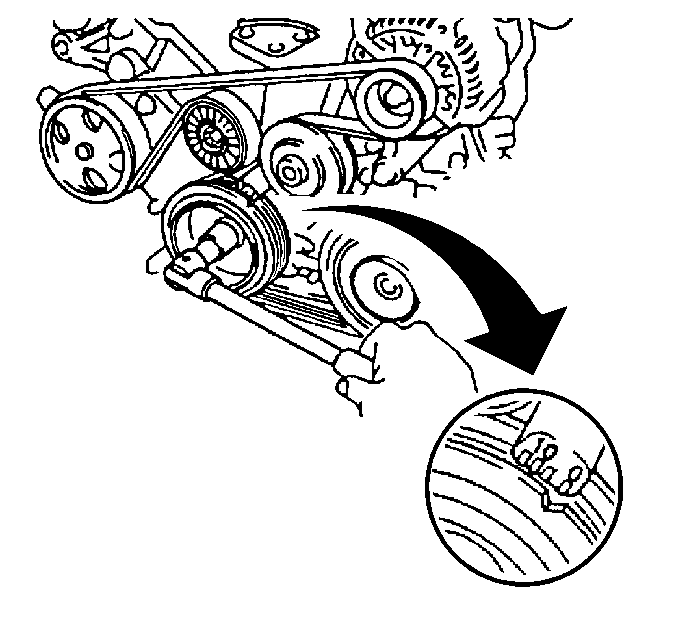
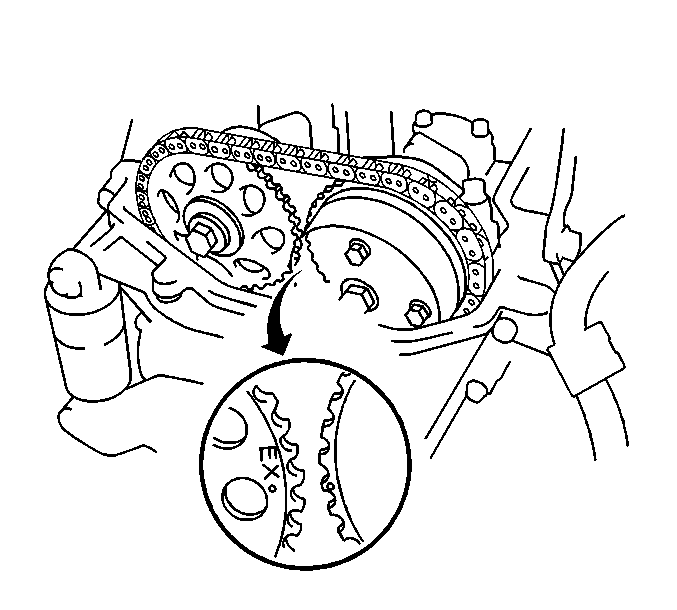
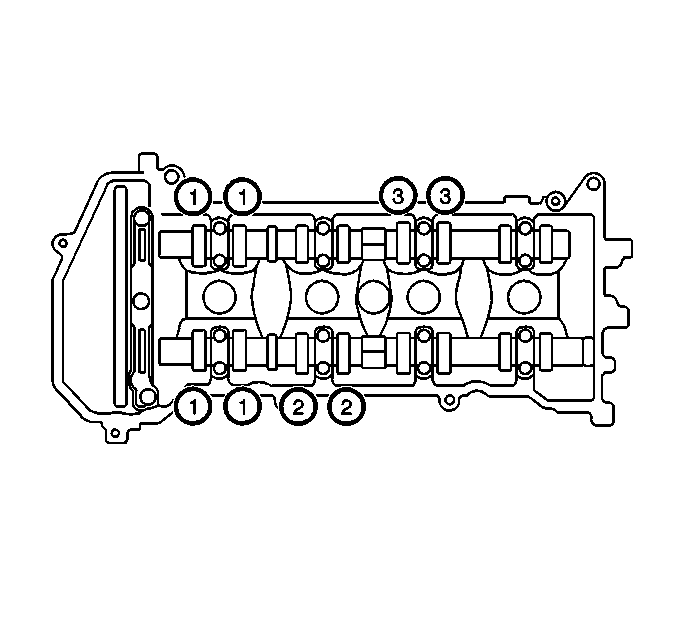
Intake Valve Clearance (Cold):
0.15-0.25 mm (0.006-0.010 in)
Important: Record any out of specification valve clearance measurements. The measurements will be used later to determine the required replacement lifter.
Exhaust Valve Clearance (Cold):
0.25-0.35 mm (0.010-0.014 in)
Important: Record any out of specification valve clearance measurements. The measurements will be used later to determine the required replacement lifter.
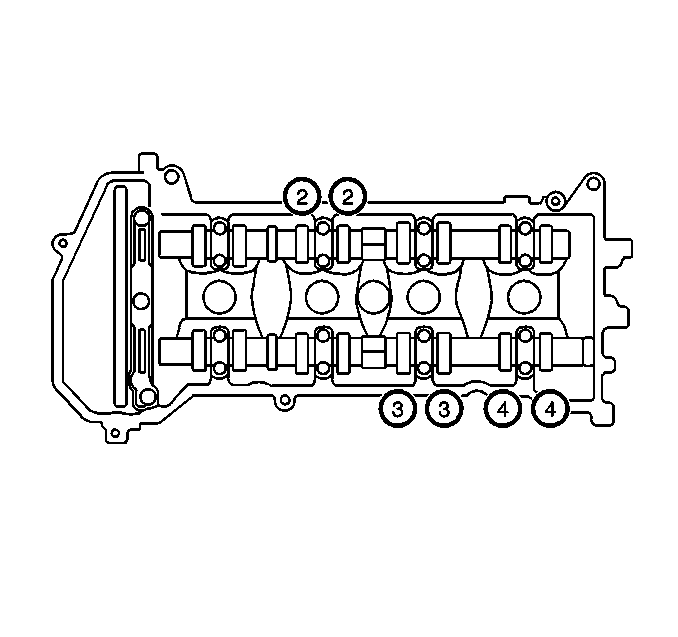
Intake Valve Clearance (Cold):
0.15-0.25 mm (0.006-0.010 in)
Important: Record any out of specification valve clearance measurements. The measurements will be used later to determine the required replacement lifter.
Exhaust Valve Clearance (Cold):
0.25-0.35 mm (0.010-0.014 in)
Important: Record any out of specification valve clearance measurements. The measurements will be used later to determine the required replacement lifter.
Lifter Selection
Important: In order to maintain the specified valve clearance the proper lifter must be selected. Perform the following procedure in order to select the proper lifter:
- Determine the valve(s) clearances that were out of specifications.
- Remove the lifter(s) from the lifter bores of the out of specification valves.
- Use a J 26900-1 to measure the thickness of the removed lifter.
- After measuring the lifter, refer to the record of the out of specification valve clearances.
- After determining the two measurements, select the proper lifter thickness for the required valve clearance.
- After selecting the proper lifter, the camshaft must be re-installed and the valve clearance re-measured. To install the intake camshaft, refer to Intake Camshaft and Valve Lifter Replacement or to install the exhaust camshaft, refer to Exhaust Camshaft and Valve Lifter Replacement .
- After confirming the valve clearance is correct for all valves, re-assemble the timing chain and timing chain housing. Refer to the installation instructions in Timing Chain and Sprocket Replacement .
- Install the cylinder head cover. Refer to the installation instructions in Cylinder Head Cover Replacement .
- Connect the negative battery cable.
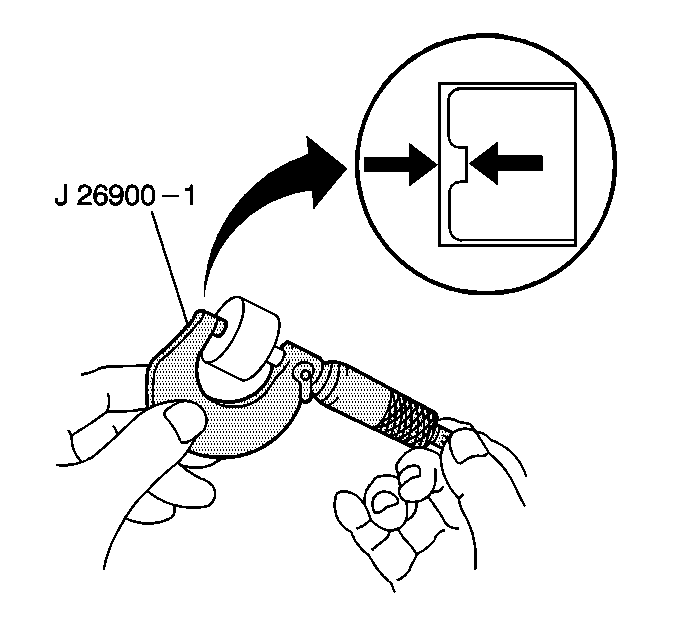
Notice: Use the correct fastener in the correct location. Replacement fasteners must be the correct part number for that application. Fasteners requiring replacement or fasteners requiring the use of thread locking compound or sealant are identified in the service procedure. Do not use paints, lubricants, or corrosion inhibitors on fasteners or fastener joint surfaces unless specified. These coatings affect fastener torque and joint clamping force and may damage the fastener. Use the correct tightening sequence and specifications when installing fasteners in order to avoid damage to parts and systems.
Tighten
Tighten the bolt to 15 N·m (11 lb ft).
